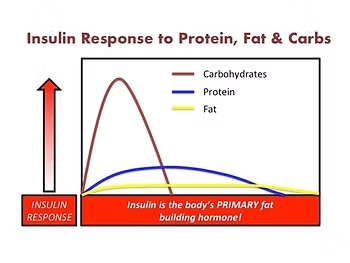Unleashing the Truth Behind the Hormone Impact on Your Health
There’s a hormone out there with a reputation that precedes it, and I’m afraid it’s not all rosy. This hormone is like a time bomb ticking away at your health. I’m talking about insulin, the hormone with a devilish double edge. With its potential to rise to extreme heights, it holds the power to cause serious damage to your health.
A Guided Tour through the Insulin Maze
Let me help you decipher the complexities of this hormone. Cast your eyes on the graph I’ve laid out for you. Over on the far left, you’ll spot a bold red arrow. No prizes for guessing – that’s our infamous insulin. You might be wondering why it’s depicted with such urgency. Let me tell you this: an excessive amount of insulin lingering in your system can be perilous.
Insulin and Your Diet: A Tale of Three Nutrients
Now, let’s swing our attention to the right of the graph. You’ll see three dietary stalwarts – carbohydrates, proteins, and fats. They may appear benign, but their interactions with insulin tell a different story.
The Carbohydrate-Insulin Connection
First up is carbohydrates. They’re the brown line on the graph. Notice how, after a carbohydrate-rich meal, insulin spikes? Now, bear in mind that insulin is an inflammation-inducing hormone. In simple terms, every disease known to humanity thrives in an environment rife with excessive insulin. What about the insulin surge after a carbohydrate load? You now know why it’s concerning.
Protein's Relative Benevolence
Lorem ipsum dolor sit amet, consectetur adipiscing elit. Ut elit tellus, luctus nec ullamcorper mattis, pulvinar dapibus leo.
The Minimalist: Fats
Lastly, we have fats. They barely register a blip on the insulin radar. Fats exercise minimal influence on your body’s insulin production – a revelation that’s bound to raise eyebrows!
When my clients approach me with chronic conditions or high insulin levels, I advocate for three specific dietary lifestyles.
1. Autoimmune Paleo Diet
The first is the autoimmune paleo diet. A unique blend of the prehistoric with a modern understanding of autoimmunity, this diet minimizes inflammatory triggers and optimizes nutrient intake.
2. The Traditional Paleo Diet
The second is the standard paleo diet, a wholesome nutritional approach that aligns with our ancestors’ eating habits.
3. Embracing Ketosis
Finally, I recommend achieving a state of ketosis. This metabolic state encourages your body to use fat for energy instead of carbohydrates, which can help control insulin levels. Check out my optimal ketogenic meal plan to get started on your wellness journey.
Take Control: Your Diet, Your Insulin, Your Health
Remember, insulin is a hormone with potentially devastating consequences. However, with each meal, you have the power to influence and manage this hormone. By keeping insulin levels as low as possible, your body can function optimally and regain the ability to heal as nature intended.
If this message resonates with you, please share it with someone you care about. Who knows, it could change a life!
Frequently Asked Questions (FAQ)
Insulin is a hormone that helps regulate blood sugar by allowing glucose to enter your cells for energy. However, when levels remain chronically high, it can trigger inflammation and contribute to many chronic diseases.
Carbohydrates cause the biggest spike in insulin, proteins raise it moderately, and fats have very little impact on insulin levels. This is why carb-heavy diets often drive insulin resistance.
Excess insulin can promote chronic inflammation, weight gain, and increase the risk of diseases such as diabetes, heart disease, and metabolic disorders.
Approaches such as the Autoimmune Paleo diet, Traditional Paleo diet, and a ketogenic diet can help reduce insulin levels by minimizing inflammatory foods and emphasizing nutrient-dense, low-carb eating.









